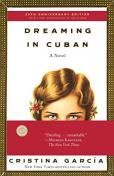BKMT READING GUIDES
Dreaming in Cuban
by Cristina García
Paperback : 245 pages
8 clubs reading this now
0 members have read this book
Introduction
“Impressive . . . [Cristina García’s] story is about three generations of Cuban women and their separate responses to the revolution. Her special feat is to tell it in a style as warm and gentle as the ‘sustaining aromas of vanilla and almond,’ as rhythmic as the music of Beny Moré.”—Time
Cristina García’s acclaimed book is the haunting, bittersweet story of a family experiencing a country’s revolution and the revelations that follow. The lives of Celia del Pino and her husband, daughters, and grandchildren mirror the magical realism of Cuba itself, a landscape of beauty and poverty, idealism and corruption. Dreaming in Cuban is “a work that possesses both the intimacy of a Chekov story and the hallucinatory magic of a novel by Gabriel García Márquez” (The New York Times). In celebration of the twenty-fifth anniversary of the novel’s original publication, this edition features a new introduction by the author.
Praise for Dreaming in Cuban
“Remarkable . . . an intricate weaving of dramatic events with the supernatural and the cosmic . . . evocative and lush.”—San Francisco Chronicle
“Captures the pain, the distance, the frustrations and the dreams of these family dramas with a vivid, poetic prose.”—The Washington Post
“Brilliant . . . With tremendous skill, passion and humor, García just may have written the definitive story of Cuban exiles and some of those they left behind.”—The Denver Post
Discussion Questions
From the publisher:1. What is the nature of Celia’s devotion to the revolution? Why is she such a true believer in it?
2. Why does Celia continue to write Gustavo? What does he represent to her? What purposes do her letters serve in the novel?
3. Why does Jorge come back to visit Celia? Why did he lie about Celia to Lourdes, and why is it important for him to tell her what he ’s done?
4. Though the events of modern-day Cuba are woven throughout the novel, García never refers to Fidel Castro by name, only as El Lider. Why does she do this and what does this bring to the novel?
5. Why does Lourdes defend her daughter after Pilar unveils the punk Statue of Liberty painting?
6. This novel is told from several different perspectives over three generations. What does this technique lend to the novel?
7. The themes of magic and faith are predominant throughout the novel. How do the novel’s characters view magic and faith, and how do they use these qualities in their daily lives?
8. All of the characters seem to be searching to fulfill unnamed desires. Can you identify what each of them want? Does regret play any part in their actions?
9. García writes, “The family is hostile to the individual.” Discuss how this applies to the novel’s characters.
10. How are the many intersections of race and class depicted in the novel?
11. By the novel’s end, all of Celia’s children are lost to her, either by death or estrangement. This is echoed by the troubled relationship between Pilar and Lourdes, the twins’ relationship with Felicia, and the final spiriting away of Ivanito.
What is García trying to show here, and why?
12. The final portion of the book, in which Lourdes and Pilar travel to Cuba, is titled “The Languages Lost.” What do you think this means? How do you interpret the other passage headings?
13. What is Pilar searching for in her relationship with her grandmother? Does she find it?
14. What is Celia’s legacy to Pilar?
15. Why does Pilar lie to Celia at the end? How is the theme of betrayal handled throughout the novel?
16. What is it that drives Celia into the sea at the end? Is it Ivanito’s disappearance or
Pilar’s lying to her or something else?
17. What does the title of the book signify? Who is “dreaming,” so to speak? Do you think García is referring to a specific character or is it a collective dreaming?
Suggested by Members
Book Club Recommendations
Recommended to book clubs by 2 of 2 members.
Now serving over 80,000 book clubs & ready to welcome yours. Join us and get the Top Book Club Picks of 2022 (so far).
Get free weekly updates on top club picks, book giveaways, author events and more








